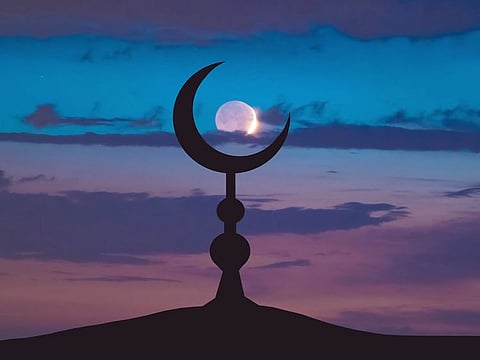COVID-19: How to make the best of this Ramadan
Many front-line medical staff are saving lives while fasting during the coronavirus crisis

The Prophet Muhammad (peace be upon him) once told his followers never to enter or leave a town that has the plague, to avoid spreading the disease.
That advice seems timely for this year’s Ramadan. The annual Islamic holy month is already upon us, during which Muslims fast from food and drink from sunrise to sunset.
Thanks to social-distancing measures to prevent the spread of the coronavirus, most of us won’t be leaving our homes, let alone our towns, this month. My family’s Google calendar is completely empty.
I know I’m not alone in my anxiety, but I also know there are people in much more difficult situations this Ramadan. I especially think of the front-line health care workers, putting in long hours and without adequate supplies, who will be fasting alone while trying to save lives
There are no community iftars, the fast-breaking meals. The local mosques are all shut.
In the years before this pandemic, despite the hangry, exhausted moments that tend to accompany fasting, Ramadan always left me with a faint smile.
I’d relish the memories of the month’s daily rituals and the beautiful chaos of a community in constant motion.
Community engagement and worship
This time, everyday life has been upended, and we will confront a different kind of chaos. How can there be community engagement and worship, which is as central to Ramadan as the fast, during a lockdown and quarantine?
During a normal Ramadan, we feast on a delicious spread of food every night, at someone’s home or at the mosque. This gathering is especially important for people without families and those without income, which is unfortunately common right now.
Nobody wants our most vulnerable community members to be breaking their fasts alone in their home.
This year, we’ll have to improvise.
Mohammad Magid, the imam of the All Dulles Area Muslim Society Centre, a large Virginia mosque, told me he would normally expect 600 people to show up for communal prayers each night during Ramadan.
This year, he’ll instead offer nightly Zoom sessions featuring a rotating group of Quran reciters so that everyone can listen from home. A social worker will organise and coordinate grocery deliveries to vulnerable members.
Challenging to adjust
It’s challenging to adjust. But he told me that any time he feels like complaining, he thinks of the Rohingya Muslims he visited in the refugee camps in Bangladesh. Even in the most dire of conditions, he said, they fasted without complaint.
“God tested the Prophet, peace be upon him, during Ramadan many times,” the imam said. “It’s a month where we learn perseverance and patience. We will make the best out of it.”
I am always inspired by such stories, but I confess I’m also prone to moments of doubt and fear. How do I concentrate on godliness when I’m trying to avoid the virus to protect my immuno-compromised daughter who just survived cancer?
I know I’m not alone in my anxiety, but I also know there are people in much more difficult situations this Ramadan. I especially think of the front-line health care workers, putting in long hours and without adequate supplies, who will be fasting alone while trying to save lives.
Commitment to faith and God
Saquib Rahim, an internal-medicine doctor working in Flushing, Queens, who has been treating Covid-19 patients since the first days of the pandemic, plans to fast this year. “I can’t think of a more appropriate way to show one’s commitment to faith and God than taking care of patients during this time,” he told me.
He’s temporarily living apart from his family to avoid the possibility of spreading the virus if he contracts it, and he admits the lack of community will be very difficult.
“It will be a unique challenge to immerse myself in faith while spending significant time alone,” he said.
As I listen to people’s stories, I’m reminded that God wants ease for his believers, not difficulty. Those who are sick or travelling are commanded not to fast. We are asked to do the most good and the least amount of harm, valuing life above all else.
So this year I will emulate prophetic behaviour by being responsible, staying at home, praying with my family, being grateful and simply trying my best.
It won’t be heroic or extraordinary, but during these challenging times, it will be enough.
Wajahat Ali is a playwright, lawyer and contributing opinion writer
(NYT)
Sign up for the Daily Briefing
Get the latest news and updates straight to your inbox







